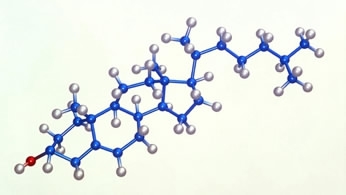
Tech & Sci
20:08, 14-Oct-2017
Cholesterol byproduct boosts spread of breast cancer

A byproduct of cholesterol called 27HC helps to spread breast cancer rather than stop it, according to a study by the University of Illinois (UI).
UI researchers gave mice with breast cancer tumors a diet high in cholesterol, and confirmed that high levels of cholesterol increased tumor growth and metastasis, and that mice treated with cholesterol-lowering drugs called statins had less metastasis.
Researchers tried to inhibit the enzyme that makes 27HC during cholesterol metabolism.
"By inhibiting the enzyme that makes 27HC, we found a suppressor effect on breast cancer metastasis. This suggests that a drug treatment targeting this enzyme could be an effective therapeutic," said Amy Baek, a postdoctoral researcher at UI and the first author of the paper.

A treatment targeting 27HC could be effective across multiple cancer types. /VCG Photo
A treatment targeting 27HC could be effective across multiple cancer types. /VCG Photo
The researchers also saw unusual activity among specific immune cells, certain types of neutrophils and T-cells at metastatic sites high in 27HC.
Normally, the human body's immune system has the capacity to attack cancer. But researchers found that 27HC works on immune cells by convincing them the cancer is fine, ultimately hijacking the immune system to help the cancer spread.
As 27HC acts through the immune system, and not on the breast cancer itself, the researchers believe their findings have broad applicability for solid tumors.
They performed experiments looking at colon cancer, lung cancer, melanoma and pancreatic cancer, and found that 27HC increased metastasis for all the tumor types. This suggests that a treatment targeting 27HC could be effective across multiple cancer types.
The researchers are working to further understand the pathways by which 27HC affects the immune cells.
"Breast cancer impacts roughly one in eight women. We've developed fairly good strategies for the initial treatment of the disease, but many women will experience metastatic breast cancer, when the breast cancer has spread to other organs, and at that point we really don't have effective therapies," said Erik Nelson, a UI professor of molecular and integrative physiology who led the study.
"We hope to develop small-molecule drugs to inhibit 27HC," Nelson said.
The study has been published in the journal Nature Communications.
10787km
Source(s): Xinhua News Agency

SITEMAP
Copyright © 2018 CGTN. Beijing ICP prepared NO.16065310-3
Copyright © 2018 CGTN. Beijing ICP prepared NO.16065310-3